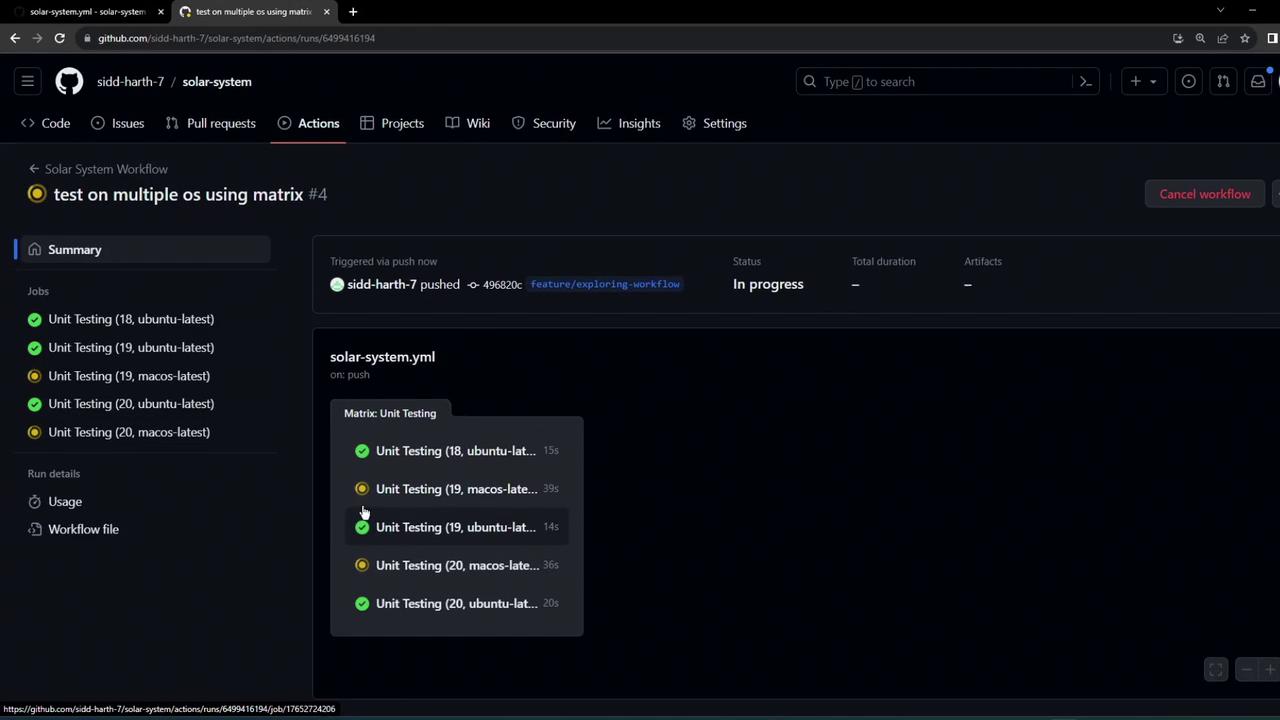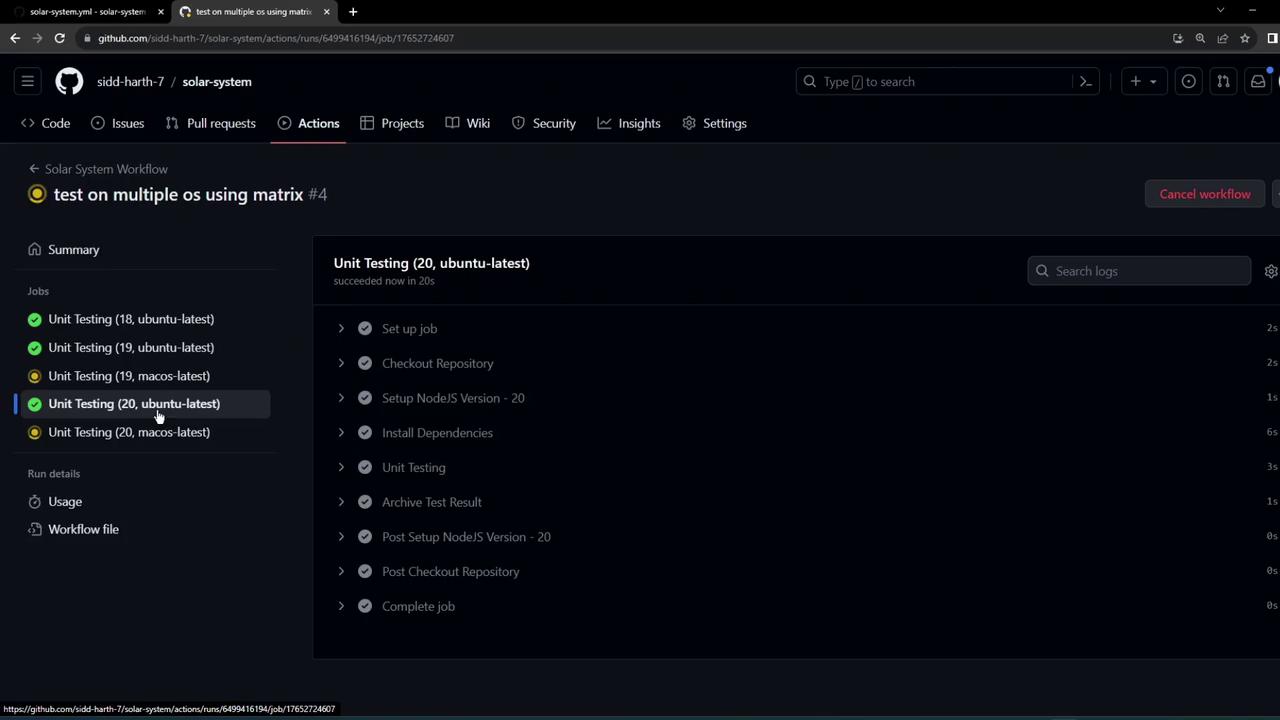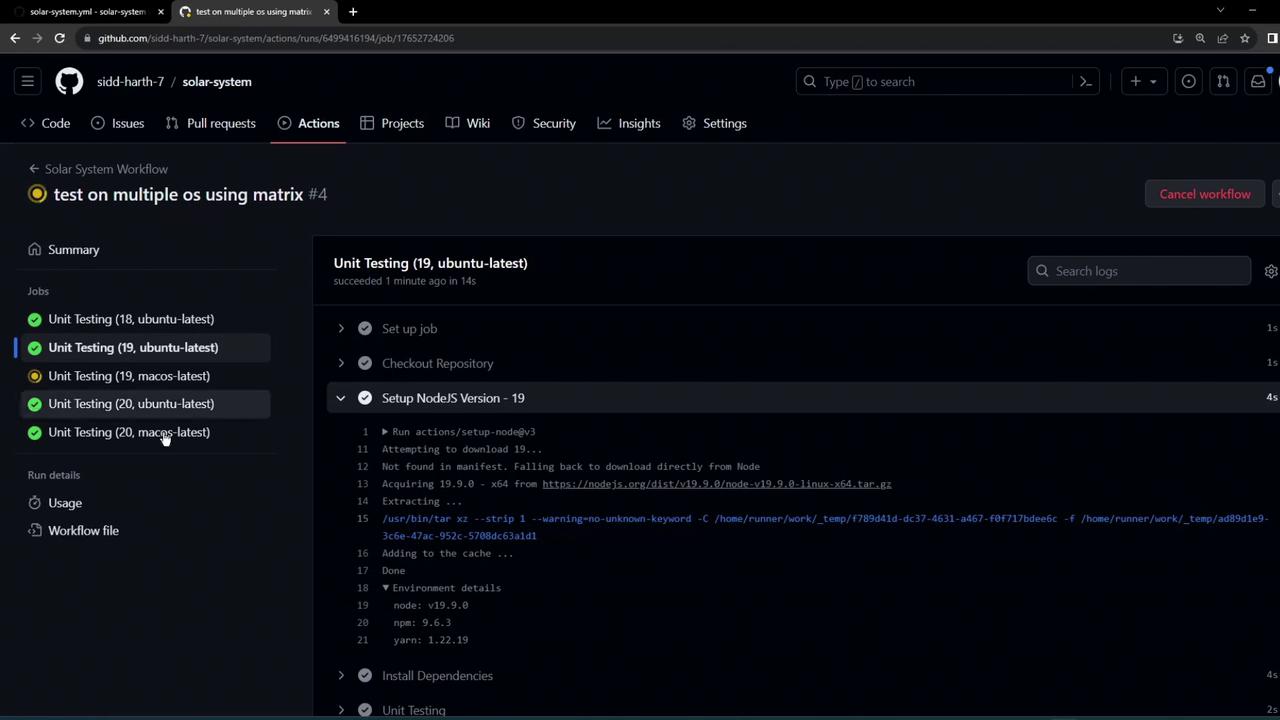GitHub Actions Certification
Continuous Integration with GitHub Actions
Run Unit Testing using Matrix Strategy
In this guide, you’ll learn how to configure a GitHub Actions workflow to run unit tests across multiple operating systems and Node.js versions by leveraging the matrix strategy. This approach generates a job for every combination of variables—such as nodejs_version and operating_system—while allowing you to exclude specific pairs.
Defining the Matrix
First, we define a matrix with three Node.js versions (18, 19, 20) and two operating systems (ubuntu-latest, macos-latest), excluding the unwanted combination of Node.js 18 on macOS:
name: Run Unit Tests
on:
workflow_dispatch:
push:
branches:
- main
- feature/*
env:
MONGO_URI: 'mongodb+srv://supercluster.d83jj.mongodb.net/superData'
MONGO_USERNAME: ${{ vars.MONGO_USERNAME }}
MONGO_PASSWORD: ${{ secrets.MONGO_PASSWORD }}
jobs:
unit-testing:
name: Unit Testing
strategy:
matrix:
nodejs_version: [18, 19, 20]
operating_system: [ubuntu-latest, macos-latest]
exclude:
- nodejs_version: 18
operating_system: macos-latest
runs-on: ubuntu-latest
steps:
- name: Checkout Repository
uses: actions/checkout@v4
- name: Setup Node.js Version - 18
uses: actions/setup-node@v3
with:
node-version: 18
- name: Install Dependencies
run: npm install
- name: Unit Testing
run: npm test
- name: Archive Test Result
uses: actions/upload-artifact@v3
Note
At this stage, both runs-on and node-version are hardcoded. In the next section, we’ll update them to use matrix variables.
Matrix Combinations Overview
To visualize which jobs will run, consider this table of all possible combinations:
| Node.js Version | Operating System | Excluded? |
|---|---|---|
| 18 | ubuntu-latest | No |
| 18 | macos-latest | Yes |
| 19 | ubuntu-latest | No |
| 19 | macos-latest | No |
| 20 | ubuntu-latest | No |
| 20 | macos-latest | No |
Referencing the Matrix Variables
Replace the hardcoded values with ${{ matrix.operating_system }} and ${{ matrix.nodejs_version }} so each job picks up the correct OS and Node.js version:
name: Run Unit Tests
on:
workflow_dispatch:
push:
branches:
- main
- feature/*
env:
MONGO_URI: 'mongodb+srv://supercluster.d83jj.mongodb.net/superData'
MONGO_USERNAME: ${{ vars.MONGO_USERNAME }}
MONGO_PASSWORD: ${{ secrets.MONGO_PASSWORD }}
jobs:
unit-testing:
name: Unit Testing
strategy:
matrix:
nodejs_version: [18, 19, 20]
operating_system: [ubuntu-latest, macos-latest]
exclude:
- nodejs_version: 18
operating_system: macos-latest
runs-on: ${{ matrix.operating_system }}
steps:
- name: Checkout Repository
uses: actions/checkout@v4
- name: Setup Node.js Version - ${{ matrix.nodejs_version }}
uses: actions/setup-node@v3
with:
node-version: ${{ matrix.nodejs_version }}
- name: Install Dependencies
run: npm install
- name: Unit Testing
run: npm test
- name: Archive Test Result
uses: actions/upload-artifact@v3
Each job will now automatically run on the specified operating system and install the appropriate Node.js version.
Commit and Observe the Workflow
Commit your changes with a descriptive message like:
git add .github/workflows/run-unit-tests.yml
git commit -m "Test on multiple OS using matrix strategy"
git push
GitHub Actions will queue five parallel jobs, each labeled by OS and Node.js version:

You can drill down into any job—for example, Ubuntu with Node.js 20—to see the step-by-step execution:

The logs confirm the setup of each Node.js version, including detailed installer output:

Note
macOS runners often take a bit longer to start. Be patient as those jobs initialize.
With the matrix strategy in place, you’ll efficiently validate your code across multiple environments without duplicating workflow configurations.
Links and References
- GitHub Actions: Using a matrix for your jobs
- actions/checkout
- actions/setup-node
- actions/upload-artifact
Watch Video
Watch video content